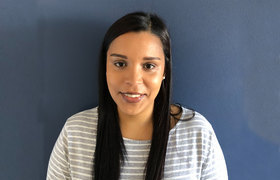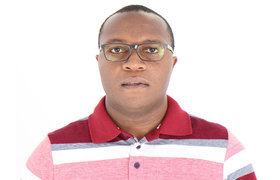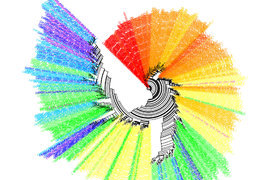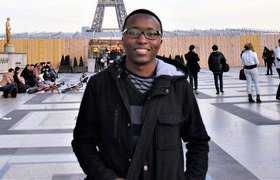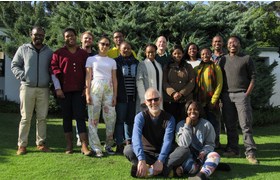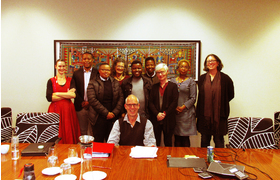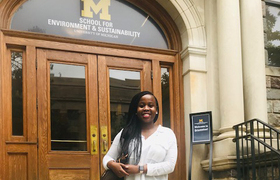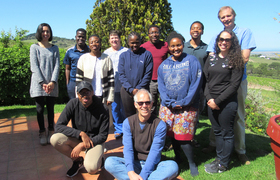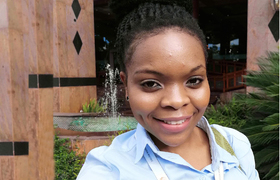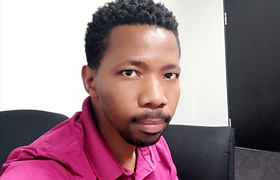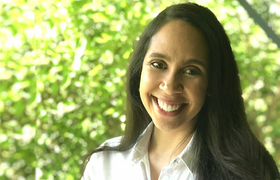'Why do we still aspire to whiteness?'
16 May 2016 | Story Yusuf Omar. Photo Je'nine May.
“Why would people hate you for the colour of your skin?” asks Zuziwe Msomi.
It's this question that has spurred Msomi, an nGAP* lecturer in the Centre for African Studies, to interrogate racial identity in post-apartheid South Africa.
“I suppose I came into academia because I like research,” says Msomi, who took up the lectureship at UCT in January this year. “I like finding out answers to things that have always bugged me. It's about knowledge more than anything else – why we're here, what we're meant to do and why the world is the way it is.
“Theory helps a lot with that. One of my earliest memories is of my dad telling me that when I go to school, people will hate me, and will hate me for no other reason than the colour of [my] skin. And that made no sense to me. I actually laughed.”
But going through primary school, high school and academia, Msomi encountered myriad racialised experiences that she couldn't quite explain.
“I entered academia to make sense of why the world is the way that it is. Why would people hate you for the colour of your skin? Why would a social good such as respect or dignity – even just the recognition that you're talking to a human being – sometimes not happen? Why wouldn't that happen?”
Questions like this have always bothered Msomi, and she's sought theories that explained this. And what has Msomi discovered so far?
“I've found out that theories can provide some insight, but they have the danger of becoming stories that we recite and fail to recognise that in practice they're not quite adequate.”
This has driven her to her current research.
“I'm interested in whiteness as a norm, and white supremacy. The daily practices that cause people to treat whiteness as the norm and as something to aspire to; why do we have that?
“Can we assume that all white people are racists? No, we can't. Can we assume that all black people have only ever engaged with race as victims? No, we can't.”
So theories must keep up with practice, argues Msomi. Nuance is key. Gender, class and sexuality all intersect with race, and analysing identity through that lens offers a much clearer picture of what makes society tick.
“We need to change the theories and explore why, say, whiteness continues to be the norm despite having a university community that is perhaps 65% black.”
“You look at someone like Prof Garuba [Professor Harry Garuba] with that breadth of knowledge, and you realise that you are still at the beginning stages of your career and finding out which committees to sit on, how to network, how to get funding, and learning that you specialise first and then you can go in different directions from there.”
Her thesis, she explains, explores the discursive strategies that Rhodes University (where she completed her master's studies) students between the years 2000 and 2013 used to construct their “raced” experiences of the university, and whether these discursive strategies challenge or reinforce the culture of whiteness.
“It's basically a question about the way we talk. It's based on the discursive analysis that looks at the way we talk as a way of creating the world around us … If you talk about the world in a particular way, you're shaping the way you and other people view the world.”
The idea is to explore whether the talk – or discursive strategies – changed over those years. And, did they?
“What's most interesting right now is that we're still working with colour-blindness, in the main, from what I can see.”
Is that across the board?
“That's the interesting thing. My participants are both black and white. It connects to what I was saying – that we can't assume that all white people are racist, nor can we assume that black people merely are victims of racism. I'm not saying that the structures and the systems don't advantage one over the other – the power relations are completely different – but we're always negotiating our spaces as individuals, and it shows in our talk, too.”
Class and gender come into it strongly, she says.
“Part of it is that we have colour-blindness as a tool to hide from racism. We live in a country where it's no longer popular to be racist – but it's not popular to be anti-racist either. With that, there are particular ways of talking that are acceptable and are easy to rely on.
“At the same time, there are people who don't fit that and who challenge that – why do they challenge that?”
It's easy to identify a theme in Msomi's work of challenging why some people are enabled and why some people are marginalised.
“I have a feeling that my research will change, but it's all around questions of oppression, marginalisation and agency … It's the inequality question that bothers me. The marginalisation and inequality question bothers me, and it always has.”
 This work is licensed under a Creative Commons Attribution-NoDerivatives 4.0 International License.
This work is licensed under a Creative Commons Attribution-NoDerivatives 4.0 International License.
Please view the republishing articles page for more information.
New Generation of Academics Programme (nGAP)
UCT has responded energetically to the New Generation of Academics Programme (nGAP), an opportunity provided by the Department of Higher Education (DHET) to build a new generation of black South African academics. The DHET’s 2015 vision document, “Staffing South Africa’s Universities Framework: A comprehensive, transformative approach to developing future generations of academics and building staff capacity”, proposes a suite of initiatives to address the challenge, with nGAP being the major instrument to increase the numbers of black South African academics.
The programme “involves the recruitment of highly capable scholars as new academics, against carefully designed and balanced equity considerations and in light of the disciplinary areas of greatest need”. The nGAP scholars are appointed into permanent positions where from the outset their conditions are customised to ensure their successful induction into the ranks of established academics.
The DHET provides funding over a six-year period to support the appointment of an nGAP lecturer, and their time is protected to provide the best possible opportunity for the completion of a doctorate degree in the shortest possible time. Once the degree is completed, the nGAP lecturer’s teaching commitments are steadily increased until they shoulder a full teaching load.
Since the first advertisement for nGAP posts in 2015, UCT has been awarded 17 nGAP positions: 5 (Phase 1), 4 (Phase 2), 3 (Phase 3) and 5 (Phase 4). These are distributed across all faculties.
UCT’s nGAP scholars operate as a single cohort, managed and coordinated by Dr Robert Morrell. Lecturers meet for quarterly meetings, writing retreats and various capacity-building activities all designed to support the completion of postgraduate qualifications (particularly doctorates) and to develop records of achievement that will testify to their emergence as self-standing, excellent academics. Each lecturer is mentored by a senior scholar, who provides support and guidance on the challenges that routinely face academics.
The nGAP manager sets great store in building the cohesion of the cohort and encouraging the establishment of new UCT networks while producing a collaborative, mutually supportive and embracing work culture.
According to Dr Morrell, “This group of academics will lead UCT in 15 to 20 years’ time ... Their vision of excellence, of being African and South African, of serving a wider community and producing knowledge for the planet, the continent and the country, will power UCT in years to come.”
Newsletters
In the news
